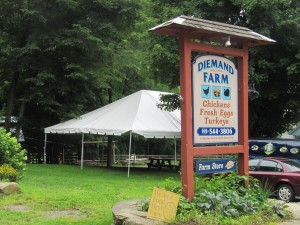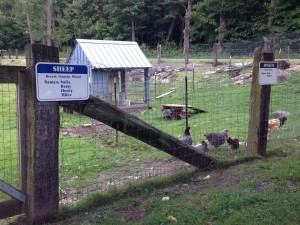 Diemand Farm is a mainstay of Wendell’s agricultural landscape. Following the pattern of a number of other newcomers to the town in the early decades of twentieth century (including the Lewis family), Connecticut-born Al Diemand bought an older farm property in 1936, and along with his wife Elsie, started a poultry business that has grown into a multifaceted operation now run by some of their many children.
Diemand Farm is a mainstay of Wendell’s agricultural landscape. Following the pattern of a number of other newcomers to the town in the early decades of twentieth century (including the Lewis family), Connecticut-born Al Diemand bought an older farm property in 1936, and along with his wife Elsie, started a poultry business that has grown into a multifaceted operation now run by some of their many children.
 Non-farmers looking at multi-generational, family-run farms like this one are often struck by the kinds of continuities that other occupations seem to lack: rootedness in a particular place, skills passed along from parents to children, nostalgic landscapes that evoke images of an older way of life. New England farmers have long made use of the nostalgia that surrounds small-scale farming for many people. Starting in the early decades of the century–when Al and Elsie Diemand were just setting up their own farm–many farms began to offer what we would now call “value-added” products (jams, jellies, fresh vegetables sold at roadside farmstands) and “agritourism” (farm-stay vacations, hayrides, “pick your own” operations). The Diemands have also created an inviting public interface for their farm, with goats, donkeys, and chickens on display and photos reflecting the farm’s history on the walls of the retail store (above).
Non-farmers looking at multi-generational, family-run farms like this one are often struck by the kinds of continuities that other occupations seem to lack: rootedness in a particular place, skills passed along from parents to children, nostalgic landscapes that evoke images of an older way of life. New England farmers have long made use of the nostalgia that surrounds small-scale farming for many people. Starting in the early decades of the century–when Al and Elsie Diemand were just setting up their own farm–many farms began to offer what we would now call “value-added” products (jams, jellies, fresh vegetables sold at roadside farmstands) and “agritourism” (farm-stay vacations, hayrides, “pick your own” operations). The Diemands have also created an inviting public interface for their farm, with goats, donkeys, and chickens on display and photos reflecting the farm’s history on the walls of the retail store (above).
But the truth is that farming is as much about change as continuity. Like all other farmers, the Diemands have continually adjusted their practices in response to changing markets, tastes, and regulations. One change came in the 1960s when chicken meat–a mainstay of the farm’s production in its early decades–became much cheaper as industrial poultry farming came to dominate the market (remember the “It takes a tough man to make a tender chicken” campaign?). Another came in 1989, when the family decided to expand its production by adding turkeys as well as chickens.
 Another change–or rather, a course adjustment–has taken place more recently. As in other sectors of the agricultural economy, federal regulations designed to curb the worst abuses of those extremely large-scale industrial farms have rebounded against small- to mid-size operations like the Diemands’, raising their costs of operation significantly and making it more difficult for them to compete in conventional commercial markets. Like many other farmers, they have moved more toward direct marketing, a strategy that lets them call more of the shots about how they’re producing and selling food.
Another change–or rather, a course adjustment–has taken place more recently. As in other sectors of the agricultural economy, federal regulations designed to curb the worst abuses of those extremely large-scale industrial farms have rebounded against small- to mid-size operations like the Diemands’, raising their costs of operation significantly and making it more difficult for them to compete in conventional commercial markets. Like many other farmers, they have moved more toward direct marketing, a strategy that lets them call more of the shots about how they’re producing and selling food.
In this case, policies put into effect about four years ago required much stricter monitoring and reporting, as well as new kinds of restrictions on how laying chickens are kept, at poultry farms with over 3,000 birds. Wholesale egg sales had been a significant part of the Diemands’ business, but the family decided that the new regulations would box them into a corner they didn’t want to be in. So they brainstormed about solutions, and decided it was time to expand the small retail store they had started a few years earlier, and to add a catering operation that would feature Al Diemand’s chicken barbecue recipe, among other favorites. Another new venture is a sawmill with which they saw lumber for customers.
The big tent on the front lawn of Diemand Farm represents more than just the new catering segment of the business. It’s a sign of the adaptability that small-scale farmers have always had to practice in order to survive economically, and a symbol of the many components, skills, and products that need to come together for that survival to continue over many decades.
For further reading/listening
- On the rise of industrial poultry farming, see Steve Striffler, Chicken: The Dangerous Transformation of America’s Favorite Food (Yale University Press, 2007).
- You can listen to an interview with Annie Diemand Bucci, one of the three principal partners in the farm, on “Taking Care of Business” (June 7, 2014). Thanks to Annie for reviewing this post before publication.
